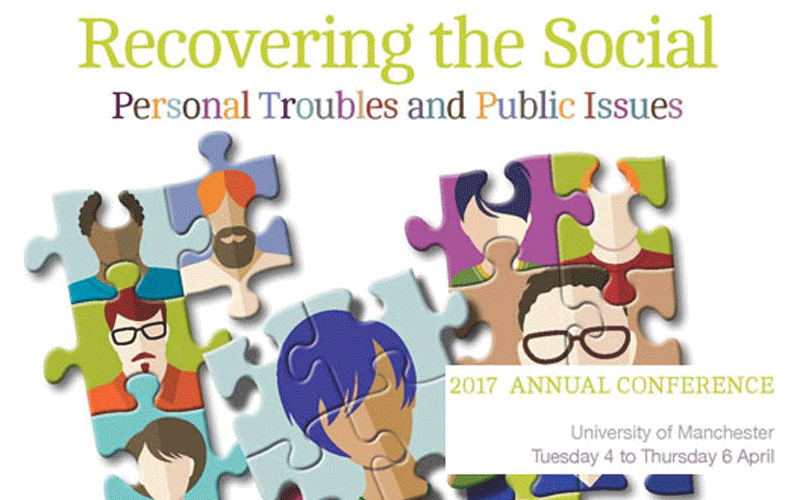Recovering the Social – Personal Troubles and Public Issues
BSA Annual Conference 2017 with Kate Burningham and Sue Venn
Manchester, 4-6 April 2017

The last decades have seen the rise of a culture of hyper-individualism in the UK, USA and elsewhere, “reversing a tentative trend towards greater social cohesion and solidarity that began to emerge in the first half of the 20th century.” It is understood that the current scenario has largely been driven by a political and public discourse stressing that autonomous individuals and their families are solely responsible for their own destinies, life chances, fortunes and misfortunes, on an equal footing with their ‘competitors’. Public policy ‘reforms’ seem tailored to increasingly favour individual greed, selfishness, discrimination and division over collective need, solidarity and empathy. These developments have been accompanied by the stigmatisation of various groups defined as ‘other’, reducing public sympathy for those least fortunate. Amongst a range of regressive developments, this has supported the dismantling of social supports that were once considered essential to both individual security and social progress.
The broad theme of the 2017 conference will consider how research “might explore and challenge misrepresentations of the relationship between the personal and the public realm, while focusing upon the myriad ways in which social arrangements govern our lives, including the various ways in which inequitable social arrangements constrain the life chances of the marginalised, in terms of class, race, ethnicity, disability, gender and sexuality.”
CUSP researchers Kate Burningham and Sue Venn will present two joint papers at the conference – outlines of which can be found below. For further details about the conference, please go to the BSA conference website.
ABSTRACTS
The Value of Things: Meanings of Acquisition, Retention and Divestment in the Transition to Retirement
Venn, S., Burningham, K.
A variety of psychological and sociological research indicates that an excessive focus on acquiring material goods is not only environmentally damaging but also associated with lower individual wellbeing (Ditmar et al 2014; Csikszentmihalyi 2000). Popular websites and books (Kondo 2015; Wallman 2015) also propound the idea that getting rid of material possessions may promote individual wellbeing. However, problematizing the acquisition of possessions and valorising their divestment ignores the complex symbolic meanings that things (and their acquisition and divestment) have and the roles they play in social relationships (Miller 2009; Hurdley 2006).
In this paper we focus on the transition to retirement as a period when people may reflect on the possessions they have, those they want to acquire and those they want to get rid of. Focusing on processes of acquisition, retention and divestment at this point in the lifecycle is significant given the growing number of people approaching or entering retirement, who are often portrayed as engaging in excessive levels of consumption which are counter to notions of sustainable living.
Drawing from serial interviews with 40 men and women in the UK transitioning to retirement (n=120), we show how retirement presents as an opportunity for people to reflect on the value of ‘things’ and suggest that consumption practices in retirement households are more nuanced than simply buying more or divesting, but rather depend on the emotional attachments to some things, the functionality of others and a desire to refresh the home in readiness for living well in later life.
Sustaining the Environment and Maintaining Family Life: Priorities in Conflict in Early Motherhood?
Burningham, K., Venn, S.
This paper explores where modes of consumption activity, which might be deemed sustainable, emerge in the everyday doing of family for first time mothers and how constructions of sustainable consumption align with or are challenged by the everyday priorities of early family life. Our approach is informed both by recent practice approaches to sustainable consumption (e.g. Shove and Spurling 2013) as well as by longstanding work on family practices (e.g. Morgan 1996). The paper draws on longitudinal qualitative research (Neal and Flowerdew 2003) with new mothers who were interviewed on several occasions before and after giving birth. Interviews focused on how everyday life and ordinary consumption shifted or remained stable over this period with sustainability only being explicitly discussed in the final interview.
Our research indicates that sustainable modes of consumption were adopted when they were in synergy with the over-riding project of doing family and were explained in terms of priorities of care, thrift or health rather than sustainability per se. Participants largely constructed sustainability as an ideal at odds with the reality of maintaining everyday family life. Sustainable consumption was conceptualised as individualised moral injunctions for specific behaviours, failure to enact these was explained in terms of more pressing demands associated with the role of mother. We suggest that there is a need for the development of more relational and positive discourses of sustainable consumption which align sustainable living with the creation and maintenance of family life.

